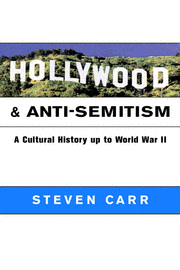Book contents
- Frontmatter
- Contents
- List of Illustrations
- Acknowledgments
- Introduction: What Is the Hollywood Question?
- Part 1 The Hollywood Question and American Anti-Semitism, 1880–1929
- Part 2 The Hollywood Question for a New America, 1929–1941
- 3 A New Deal for the Hollywood Question
- 4 The Hollywood Question in Popular Culture
- 5 The Politics of the Hollywood Question
- 6 Answering the Hollywood Question
- Part 3 The Hollywood Question, 1941 and Beyond
- Notes
- Bibliography
- Index
3 - A New Deal for the Hollywood Question
Published online by Cambridge University Press: 10 December 2009
- Frontmatter
- Contents
- List of Illustrations
- Acknowledgments
- Introduction: What Is the Hollywood Question?
- Part 1 The Hollywood Question and American Anti-Semitism, 1880–1929
- Part 2 The Hollywood Question for a New America, 1929–1941
- 3 A New Deal for the Hollywood Question
- 4 The Hollywood Question in Popular Culture
- 5 The Politics of the Hollywood Question
- 6 Answering the Hollywood Question
- Part 3 The Hollywood Question, 1941 and Beyond
- Notes
- Bibliography
- Index
Summary
“A DEEP-TONED SYMPHONY”
On the eve of the 1929 Great Depression, Will Hays, head of the Motion Picture Producers and Distributors Association, delivered a stirring address on the place of movies in an emerging, modern, and pluralistic America:
One stands on a high mountain and sees long lines of men, women, and children moving slowly forward. They come from everywhere. They are rosy-cheeked girls from the farms, and their paler-faced sisters from the cities whose feet ache from long hours of standing behind bargain counters. There are plow boys, and sons of millionaires, and boys with the sallow cheeks of the tenements. There are old women with hands reddened and coarsened by work, and with eyes grown listless with long waiting. There are old men who hobble on crooked sticks, and children with the flash of the sun's gold in their hair and the happy laughter of innocence in their voices. There are the schoolboy, and the savant, and the man of no learning at all. There are men and women of every race and of every tongue, moving slowly forward, seeking something, seeking, searching, yearning – asking for a place to dream. All about them is the roar of the cities, the confused jangling noises of life that is hurried, rushed, propelled forward at a breathless speed. Every minute of every hour of every day they come – millions of them. And over and above them, and in front of them, attracting them on, offering that which they desire, are billions of flickering shadows – the motion picture. […]
- Type
- Chapter
- Information
- Hollywood and Anti-SemitismA Cultural History up to World War II, pp. 97 - 131Publisher: Cambridge University PressPrint publication year: 2001



